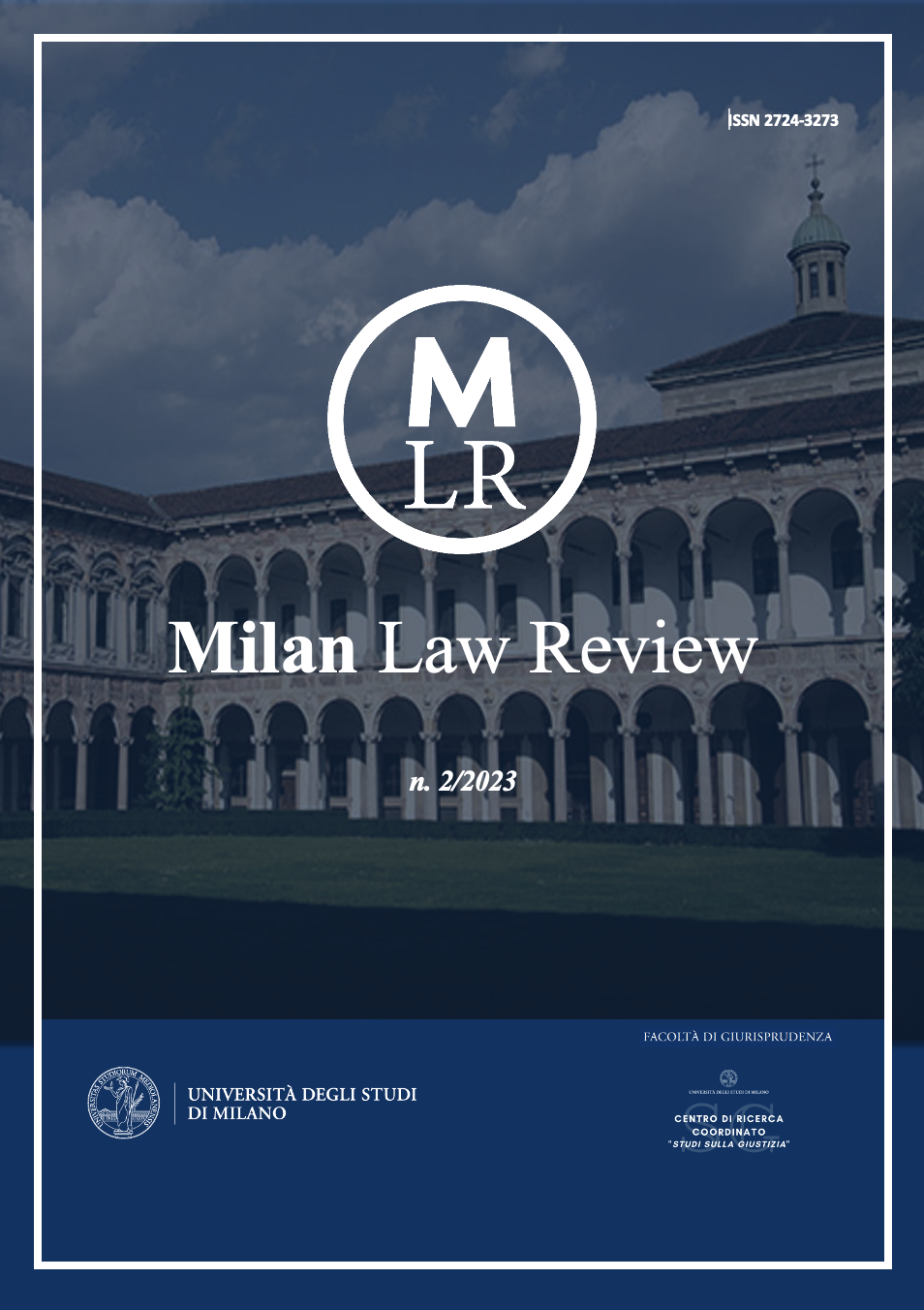Human Rights: Ethics, Rhetoric and Politics
DOI:
https://doi.org/10.54103/milanlawreview/22190Keywords:
Human Rights, public deliberation, political minimalism, rational persuasion, practical incommensurabilityAbstract
The aim of this paper is twofold. First, it seeks to explain why discourse on Human Rights allows for certain insidious political strategies, which have been recently criticized by authors skeptical of the notion of human rights. Secondly, it aims to justify a more positive appreciation of its political function. The main thesis argues that discourse on Human Rights can play a fundamental role in politics as long as we do not assume that Human Rights exhaust the realm of political justification. The framework for defending this thesis is based on a conception of Human Rights as a particular kind of ethical demands, an understanding of the rhetorical dimension of communication in terms of its ability to generate beliefs and various other forms of attitudes, and a conception of political normativity, i.e., political minimalism, which asserts that politics is an exercise in prudential rationality, involving a political community. Within this framework, Human Rights serve a primary political function by reducing occasions for incommensurability in political deliberation and impasses in decision-making.
Downloads
References
Ch. Beitz, The idea of Human Rights, Oxford Academic, Oxford, 2012
L. Bermejo-Luque, Giving Reasons. A linguistic pragmatic approach to Argumentation Theory, Springer, Dordrecht, 2011
L. Bermejo-Luque, Giving reasons does not always amount to arguing, en Topoi, 2019, vol. 38, p. 659-668
L. Bermejo-Luque, Williams for and against. Politics as a constitutively normative practice, en Topoi (en prensa)
L. Bermejo-Luque, J. Rodríguez-Alcázar, Justifying the Precautionary Principle as a political principle, en Ethics in Science and Environmental Politics, 2023, vol. 23, p. 7-22
L. Bermejo-Luque, J. Rodríguez-Alcázar, Politics, normativity and political normativity (en evaluación)
C. Douzinas, Human rights and empire: the political philosophy of cosmopolitanism, Routledge, Oxford, 2007
R. Geuss, History and Illusion in Politics, Cambridge University Press, Cambridge – MA, 2001
E.M. Hafner-Burton, J. Ron Human Rights Institutions: Rhetoric and Efficacy, en Journal of Peace Research, 2007, vol. 44(4), p. 379-384
E. Hall, D. Tsarapatsanis (2021) Human Rights, Legitimacy, Political Judgement, en Res Publica 2021, vol. 27, p. 171-185
S. Hopgood, The Endtimes of Human Rights, Cornell Univ. Press, Ithaca – NY, 2014
M. Ignatieff, Human Rights as Politics and as Idolatry, Princeton University Press, Princeton - N.J., 2001
R. Johnson, Manifest Rationality: A Pragmatic Theory of Argument, Lawrence Erlbaum Associates, Mahwah – NJ, 2000
A. Kapczynski, The Right to Medicines in an Age of Neoliberalism, en Humanity: An International Journal of Human Rights, Humanitarianism, and Development, 2019, vol. 10(1), p. 79-107
N. Klein, The Shock Doctrine: The Rise of Disaster Capitalism, Picador, New York, 2007
S. Marks, Human Rights and Root Causes, en Modern Law Review, 2011, vol. 74(1), p. 57-78
S. Moyn, Not Enough: Human Rights in an Unequal World, Belknap Press, Cambridge – MA, 2018
R. Pinto, Argument, Inference, and Dialectic, Kluwer Academic Pub, Dordrecht, 2011
E. Posner, The Twilight of Human Rights Law, Oxford University Press, Oxford, 2014
J. Rodríguez-Alcázar, Beyond realism and moralism: a defence of political minimalism, en Metaphilosophy, 2017, vo. 48(5), p. 727-744
J. Rodríguez-Alcázar, L. Bermejo-Luque Cosmopolitanism as ideology: neither a moral project nor a political impossibility (en evaluación)
A. Sen, Elements of a Theory of Human Rights, en Philosophy & Public Affairs, 2004, vol. 32(4), p. 315-356
A. Sen, The Idea of Justice, Harvard University Press, Cambridge – MA, 2009
J. Whyte, The morals of the market: Human rights and the rise of neoliberalism, Verso Books, New York, 2019
B. Williams, In the beginning was the deed: realism and moralism in political argument, Princeton University Press, Princeton, 2005
Downloads
Published
How to Cite
Issue
Section
License
Copyright (c) 2023 Milan Law Review

This work is licensed under a Creative Commons Attribution-NonCommercial-NoDerivatives 4.0 International License.




